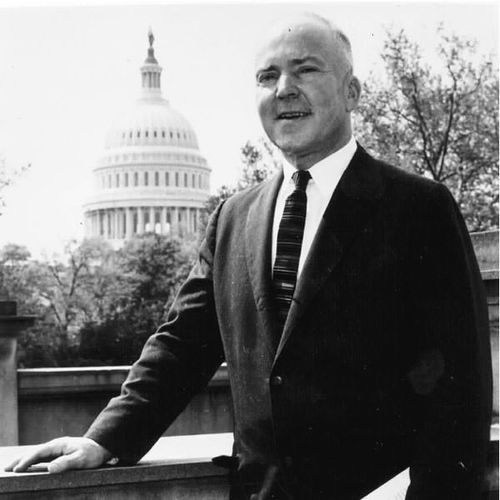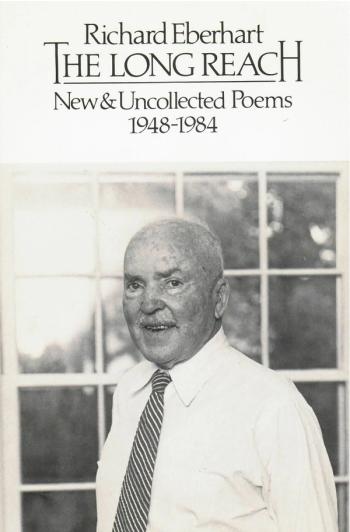Richard Eberhart
Richard Eberhart was born in Austin, Minnesota on April 5, 1904. The son of a prosperous businessman, he was raised on Burr Oakes, his family’s forty-acre estate, and in 1921, entered the University of Minnesota. The following year, his mother died of cancer (the event which, Eberhart says, made a poet of him). Soon afterward, it was discovered that an employee of his father’s had embezzled over a million dollars, and the family fortune was largely wiped out. Possibly to escape all this turbulence, Eberhart transferred from the University of Minnesota to Dartmouth, receiving his BA in 1926. In 1927, he enrolled in St. John’s College, Cambridge, and was awarded a second BA in 1929. The following year he served as tutor to the 13-year-old son of King Parjadhipok of Siam. Returning to the US, he spent 1932-33 as a graduate student at Harvard, but was forced to drop out for financial reasons. He found work at St. Mark’s School in Southborough, Massachusetts (Robert Lowell was one of his most promising students), and remained there until 1940. During World War II, Eberhart was a gunnery officer for the Navy, and it was this experience that inspired “The Fury of Aerial Bombardment,” one of his best-known poems. After the war, he became assistant manager of the Butcher Polish Company and worked actively for the company for the next six years. In 1952, he returned to teaching, serving as professor or poet-in-residence at the University of Washington, the University of Connecticut, Wheaton College, and Princeton, before being appointed in 1956 Professor of English and Poet-In-Residence at Dartmouth, where was Professor Emeritus. Oxford University Press in New York and Chatto & Windus in London published Richard Eberhart’s books concurrently from his first, A Bravery of Earth (1930), through Collected Poems 1930-1976. New Directions brought out Selected Poems 1930-1965, which won the 1965 Pulitzer Prize for Poetry, and The Long Reach: New and Uncollected Poems 1948-1984 published in 1984. Besides the Pulitzer Prize, Eberhart’s poetry has garnered many awards, including the Guaranator’s Prize (1946), the Harriet Monroe Memorial Prize (1950), the New England Poetry Club Golden Rose (1950), the Shelley Memorial Award (1952), The Bolligen Prize (1962), the Fellowship of the Academy of American Poets (1969), the National Book Award (1977), and the President’s Medallion, University of Florida (1977). He has served as Poetry Consultant to the Library of Congress (1959-1961), and as Honorary Consultant in American Letters (1963-69), and is a member of the American Academy and Institute of Arts and Letters and the American Academy of Arts and Sciences. In 1979, the New Hampshire State Legislature officially named him Poet Laureate, and in 1981 he received a Poet Laureate Diploma from the World Academy of Arts and Cultures, Republic of China. He died in 2005.

